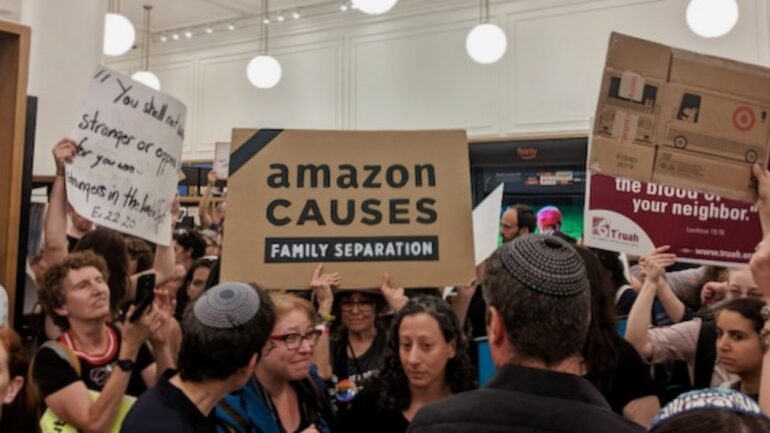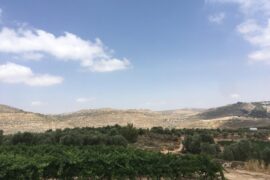Jews across the United States took to the streets on Sunday, marking Tisha B’Av with protests against the American government’s treatment of im/migrants and asylum seekers.
Tisha B’Av translates from Hebrew as “the ninth of Av” and commemorates the destruction of Jerusalem and Jewish civilization by the Roman Empire nearly 2,000 years ago on that date. Many subsequent tragedies befell the Jewish people on the ninth of Av but all forms of oppression and persecution in the Diaspora, up to and including the Nazi Holocaust, are traditionally understood to result from the initial destruction of Jerusalem and Israel’s exile from Judea.
Sunday’s protests are the latest in a series of direct actions by Jewish groups against the the US Department of Homeland Security’s Immigration and Customs Enforcement (ICE) unit.
The actions came one week after 22 people were killed and 24 others wounded in a mass shooting at a Walmart in El Paso, Texas. The suspect confessed to the shooting and said he had specifically intended to target Mexicans.
In New York, during the Jewish day of mourning, over 500 Jews joined the “Close the Camps” demonstrations, holding signs reading “Never Again.”
The group marched on Manhattan’s Amazon bookstore to protest the online retail giant’s ties to ICE.
Many activists sat down on the floor and disrupted business while others gathered on the sidewalk outside. Roughly 40 people were arrested during the Amazon protest and have been given court dates for Rosh HaShana.
ICE, first established under US President George W. Bush administration but accelerated under the administrations of Barack Obama and Donald Trump, has been stepping up its enforcement of restrictive immigration policies against im/migrants and refugees.
The agency has taken criticism for its inhumane practices, such as unhygienic living spaces, forced separation of children from their parents and a gross violation of basic protections.
A Department of Homeland Security report has even confirmed the existence of squalid, unsanitary and unsafe conditions for both adults and children in detention centers along the US border with Mexico.
“Amazon is an enabler of Trump’s deportation machine!” declared community activist Yael Rapport.
“The brutal anti-immigration campaign by ICE is powered by technology put forward by Amazon and it forms the backbone for ICE’s operations to track, identify and hunt down immigrants.”
The Amazon store action was part of a broader wave of Jewish protests on Tisha B’Av against ICE’s treatment of undocumented immigrants. Demonstrations were held in over 50 locations throughout the US, including ICE offices and detention centers in over a dozen cities.
In DC, a similar demonstration was held near the White House on Lafayette Square. Hundreds of protesters attended, carrying signs that read “My people were refugees too.”
Beyond the major cities with large Jewish populations, smaller groups also organized their own events in Utah, North Carolina, Iowa, New Mexico, Michigan, Wisconsin, Arizona, Colorado and Texas.
A solidarity protest was also held outside the old US Embassy in Tel Aviv.
The demonstrations, organized by Never Again Action, drew explicit links between the treatment of Jews during the Holocaust and that of undocumented im/migrants across the US today.
Comparisons between the Holocaust and American immigration policy have created a rift among US Jews. Those involved in the protests say it’s their duty as Jews to invoke the Holocaust while challenging injustice. Others assert that the Holocaust was in no way comparable to the situation in ICE detention centers, and that using terms like “concentration camp” and “Never again” trivializes the anti-Jewish genocide perpetrated by Nazi Germany.
The offense many Jews feel when hearing comparisons between the Holocaust we experienced and the oppressions of others is understandable, especially at a time when there are less and less survivors of the Shoah around to tell their stories to future generations.
It’s also true that ICE isn’t gassing people to death by the tens of thousands on a daily basis. But no one is actually making that claim. And desensitization to our 75-year-old trauma shouldn’t be our primary concern when people are suffering real persecution today.
The Holocaust carries a particularist Jewish message of “Never Again” but also a universal message that calls on us to protect others from the brutality we have faced – even when that brutality doesn’t reach the same heights. Without getting into the “oppression olympics” of whose suffering is worse, the fact of the matter is that we were brutally victimized and barely anyone came to our rescue. We should show up for others as we wanted others to show up for us.
And even beyond our own experiences of oppression, the Jewish people carries within us an inner drive to combat injustice in all its forms. Fighting oppression is actually part of our collective identity and mission.





